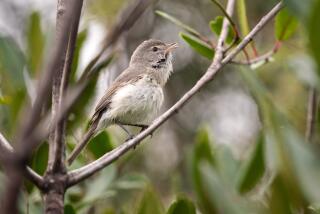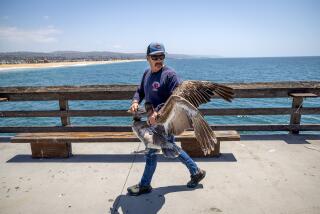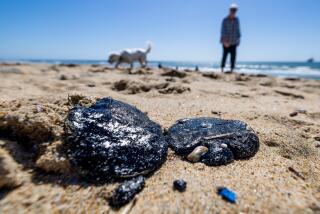Oil Spill Poses Threat to Birds at Bolsa Chica
- Share via
The Bolsa Chica wetlands, famous as a haven for rare birds, turned unnaturally treacherous Sunday when waters coated by an oil spill endangered dozens of birds and mobilized a major rescue drama.
Rescue workers scooped oil-doused ducks and grebes from a flood-control channel, racing against the clock to find injured wildlife before darkness fell and plunging temperatures further threatened the birds.
Emergency cleanup crews worked in tandem to keep the oil sheen from spreading from the channel deeper into the wetlands, one of Southern California’s best-known havens for rare coastal waterfowl.
That an oil slick could penetrate the fabled Bolsa Chica wetlands clearly left rescuers shaken.
“It makes me sad, really sad, because it’s from human impact,” said Lisa Birkle of Fountain Valley, a volunteer rescue worker, after an unsuccessful attempt to lure two ducks from water glinting with a faint rainbow of oil.
Nearly two dozen oiled birds were being treated Sunday night at the Wetlands and Wildlife Care Center in Huntington Beach, where 20 weary volunteers braced for the arrival of an estimated 30 to 50 more sickly birds today.
It was a stark illustration of how a small amount of spilled oil--perhaps as little as 30 gallons, officials said--can create a potentially lethal sheen that wreaks havoc with wildlife.
U.S. Coast Guard officials are investigating the cause of the spill, which they suspect started several miles upstream from the wetlands. The oil appeared to be a light waste oil, which is less damaging to birds than thick, crude oil.
Despite the small amount of oil spilled, workers were tight-jawed and somber as they pulled birds from the water and brainstormed on how to contain the oil.
A yellow-suited volunteer caught a grebe in his net, gently transferring the beady-eyed, bewildered bird into a cardboard box to be transferred to the care center.
“It’s oiled. There’s no way of knowing how bad it is now,” said volunteer Jim Robins. And oil-soaked feathers weaken a bird’s resistance to cold, making it vulnerable on a chilly Sunday evening when temperatures in the 40s were expected.
Soon after sunset, cleanup crews raced to install a new floating boom after oil was detected in an inlet thick with birds close to Pacific Coast Highway. Graceful black skimmers skated across the waters, while black-crowned night herons lined up on shore to spend the night.
A single brown pelican bobbed perilously close to the oil sheen.
Bird expert Loren Hays stood silently at the water’s edge, his eyes riveted on the pelican.
“I tried to ‘haze’ him away with a rock, and he wouldn’t go,” said Hayes, senior biologist with the U.S. Fish and Wildlife Service.
“They’re so used to people, here in this benign environment.”
Emergency crews drove a truck right up to the inlet, its wheels close to the water. The truck was installed with a loud horn that rang out once, then twice.
The birds scattered, the pelican disappeared.
The 1,100-acre Bolsa Chica wetlands is slated to become a major wildlife refuge. Once threatened with plans for 900 homes, the largest piece of wetlands was bought by the state in early 1997. It is home to such endangered birds as the light-footed clapper rail, California least tern and Belding Savannah sparrow, but none are known to have been hurt by the weekend spill.
The Coast Guard worked with the state Department of Fish and Game at Bolsa Chica, calling in Foss Environmental and Infrastructure, an environmental cleanup firm that installed booms across the flood-control channel and mopped the water surface with oil-absorbing pads.
As they set a new boom in place, workers were forced to use rowboats instead of powerboats so they wouldn’t disturb the wildlife.
Waterfowl oiled at Bolsa were treated a few minutes’ drive down the coast at the wildlife care center, where workers carefully inspected the birds--even taking their temperatures and blood samples--and kept them in cages warmed by lights.
Already, the workers were treating 22 mallard ducks soaked in crude oil at the Chevron Oil refinery in El Segundo. A transfer line between two refinery tanks had broken, with oil spilling into a reservoir that serves as a catch basin, halting overflow into the ocean. But curious ducks flew into the reservoir, emerging so oil-soaked that the male mallards’ emerald heads had turned black.
Volunteers followed state protocol, washing the mallards in 104-degree water treated with Dawn dishwashing liquid.
Back at Bolsa Chica, the cleanup crew prepared to work into the night under the glare of light towers. Neighbors could face a sleepless night, between the floodlights and the squawk of the “hazing” horn chasing birds from oiled waters.
“Anything in this area is significant,” said Michael McDermott, state Fish and Game warden. “There’s too much here to take chances.”
More to Read
Sign up for Essential California
The most important California stories and recommendations in your inbox every morning.
You may occasionally receive promotional content from the Los Angeles Times.













